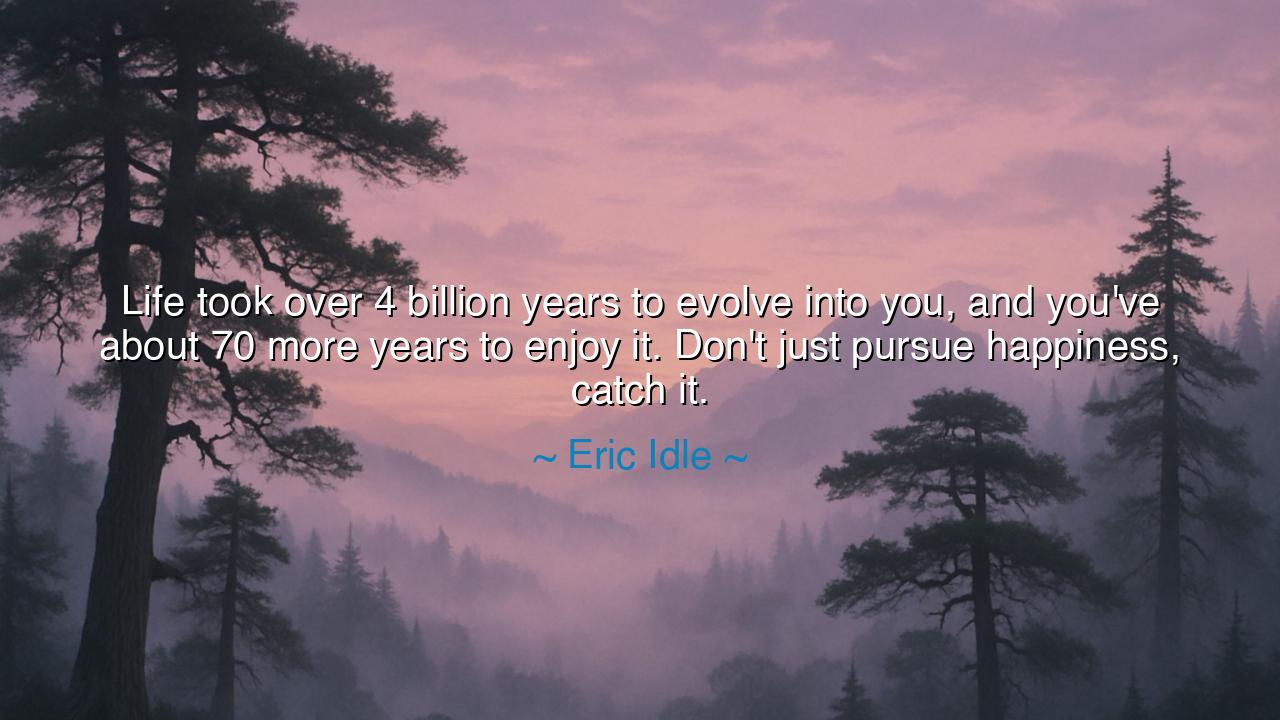
Life took over 4 billion years to evolve into you, and you've
Life took over 4 billion years to evolve into you, and you've about 70 more years to enjoy it. Don't just pursue happiness, catch it.






“Life took over 4 billion years to evolve into you, and you’ve about 70 more years to enjoy it. Don’t just pursue happiness, catch it.” Thus spoke Eric Idle, the poet of laughter and philosopher of jest, whose wit often carried the weight of truth. Beneath his humor lies a revelation older than mountains: that life, the miracle that fashioned us from dust and dream, is not to be squandered in restless longing, but to be lived — fully, fiercely, and gratefully. This quote, though wrapped in lightness, carries the thunder of cosmic perspective: the universe has labored eons for your existence, and the time given to you is but a breath in that endless story. To waste it chasing happiness as though it were distant is to misunderstand the gift of being alive.
The origin of this wisdom lies not in scripture or solemn philosophy, but in the spirit of joy that Eric Idle embodied through art and laughter. A member of Monty Python, he spent his life showing that humor, far from being frivolous, is one of humanity’s highest expressions of awareness. For in humor, there is truth uncloaked — a reminder that the absurdity of existence itself is something divine. And in this saying, Idle gathers both science and soul into a single flame: that life has evolved through struggle and time, through chaos and order, through countless deaths and rebirths, to produce the consciousness now hearing these words. To realize this is to stand in awe of the vastness that preceded you — and then to smile, knowing that you are its living triumph.
To say “4 billion years” is to summon the story of creation itself — from the first spark of life in the primal seas to the rise of mind and memory. Stars were born and died to forge the atoms in your blood. Oceans churned, mountains rose and fell, and uncounted generations of creatures walked, swam, and flew so that you might stand here, thinking, feeling, and breathing. In that vast unfolding, your life — your seventy years, more or less — may seem small, yet it is the flowering of everything that has ever been. To pursue happiness while forgetting this wonder is like searching for water while standing in the rain. Happiness is not a thing to chase; it is the awareness that you are already part of a miracle.
History, too, offers examples of those who understood this truth. Consider Marcus Aurelius, the philosopher-king of Rome. Amid the burdens of empire and the certainty of death, he wrote to himself, “Dwell on the beauty of life. Watch the stars, and see yourself running with them.” Though surrounded by war and sickness, he saw what Idle reminds us of: that existence itself is a gift beyond price. Even in hardship, the simple act of being — of breathing, of thinking, of loving — is enough to make the heart rejoice. Such awareness turns even pain into reverence. For when we awaken to how rare our existence is, gratitude becomes our natural state, and happiness ceases to be something pursued — it becomes something lived.
Idle’s challenge — “Don’t just pursue happiness, catch it” — is both playful and profound. To pursue implies that happiness lies ahead, always just beyond reach. But to catch it is to awaken now, to seize the fleeting moment before it passes. The laughter shared with a friend, the warmth of sunlight on your face, the breath that moves quietly through your lungs — these are not preludes to life; they are life itself. Happiness is not hidden in the future; it waits patiently in the present, often disguised as the ordinary. The wise learn not to chase it, but to recognize it when it smiles upon them.
Yet to catch happiness requires courage — the courage to stop running, to stand still in a world that tells you always to strive for more. Modern man builds his prisons out of ambition, measuring his worth in possessions, titles, and endless goals. But the universe, in its silent grandeur, cares for none of these. It asks only that you be awake, that you live while you are alive. To remember that you are the child of 4 billion years of creation is to be humbled and empowered all at once. You are not small; you are the consciousness through which the cosmos knows itself.
Therefore, dear seeker, take this teaching to heart: do not postpone joy. Do not wait for perfect days or untroubled hours. The miracle has already happened — you exist. The time to live is not someday, but now. Look upon your life, with all its imperfections, and see how wondrous it truly is. When fear or sorrow darken your spirit, remember the countless lifetimes that struggled to bring you forth. To honor them, live bravely. Laugh often. Love freely. Stand in awe of the sky and the soil beneath your feet, and know that both were shaped for you.
For in the end, as Eric Idle’s wisdom reveals, life itself is happiness waiting to be caught — swift, fleeting, but radiant. It took billions of years for the universe to whisper your name into being; do not let your brief moment pass without answering back with joy. Catch happiness — not in grand achievements, but in the simple miracle of being here, alive, in the heart of creation.






AAdministratorAdministrator
Welcome, honored guests. Please leave a comment, we will respond soon